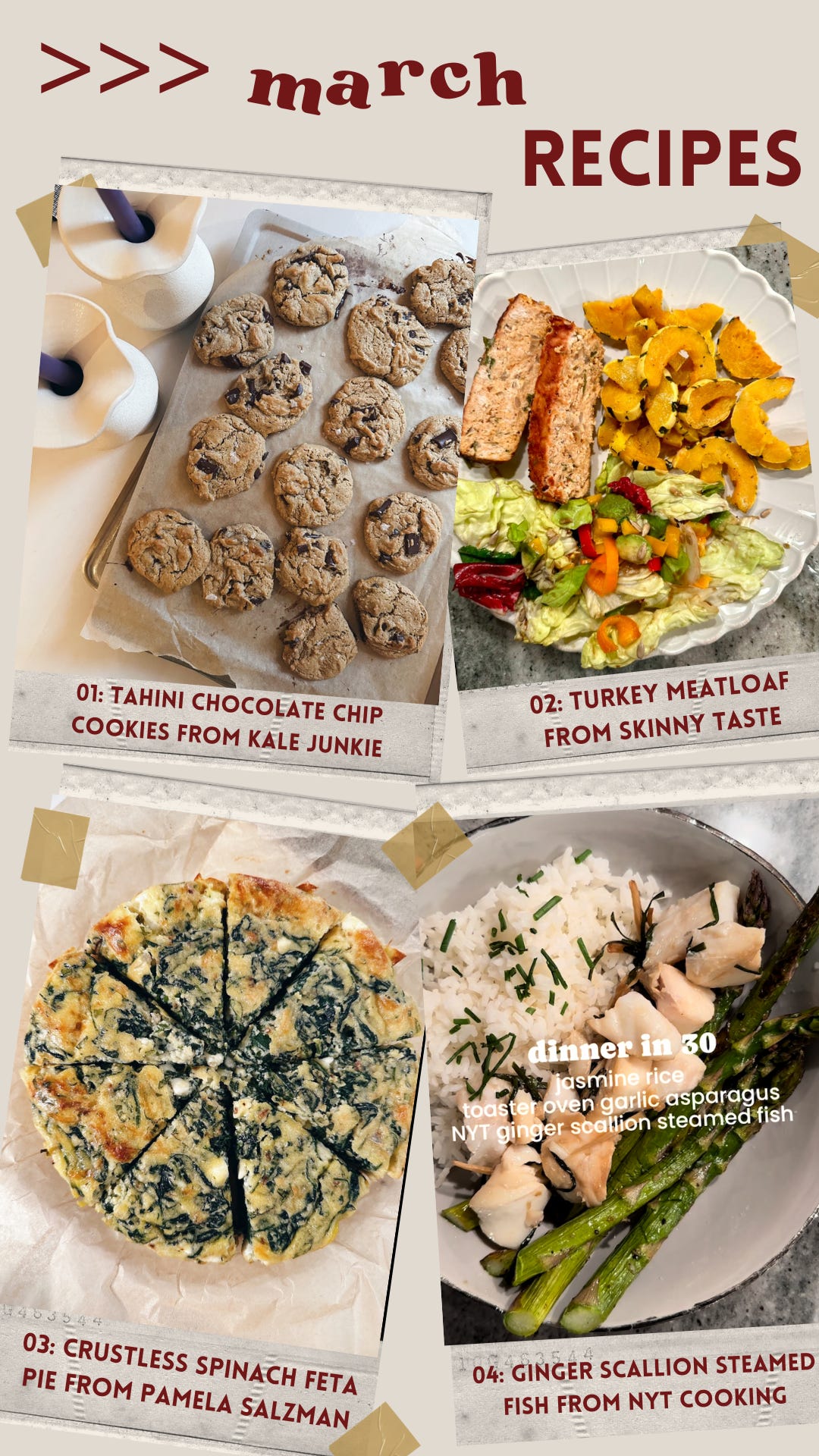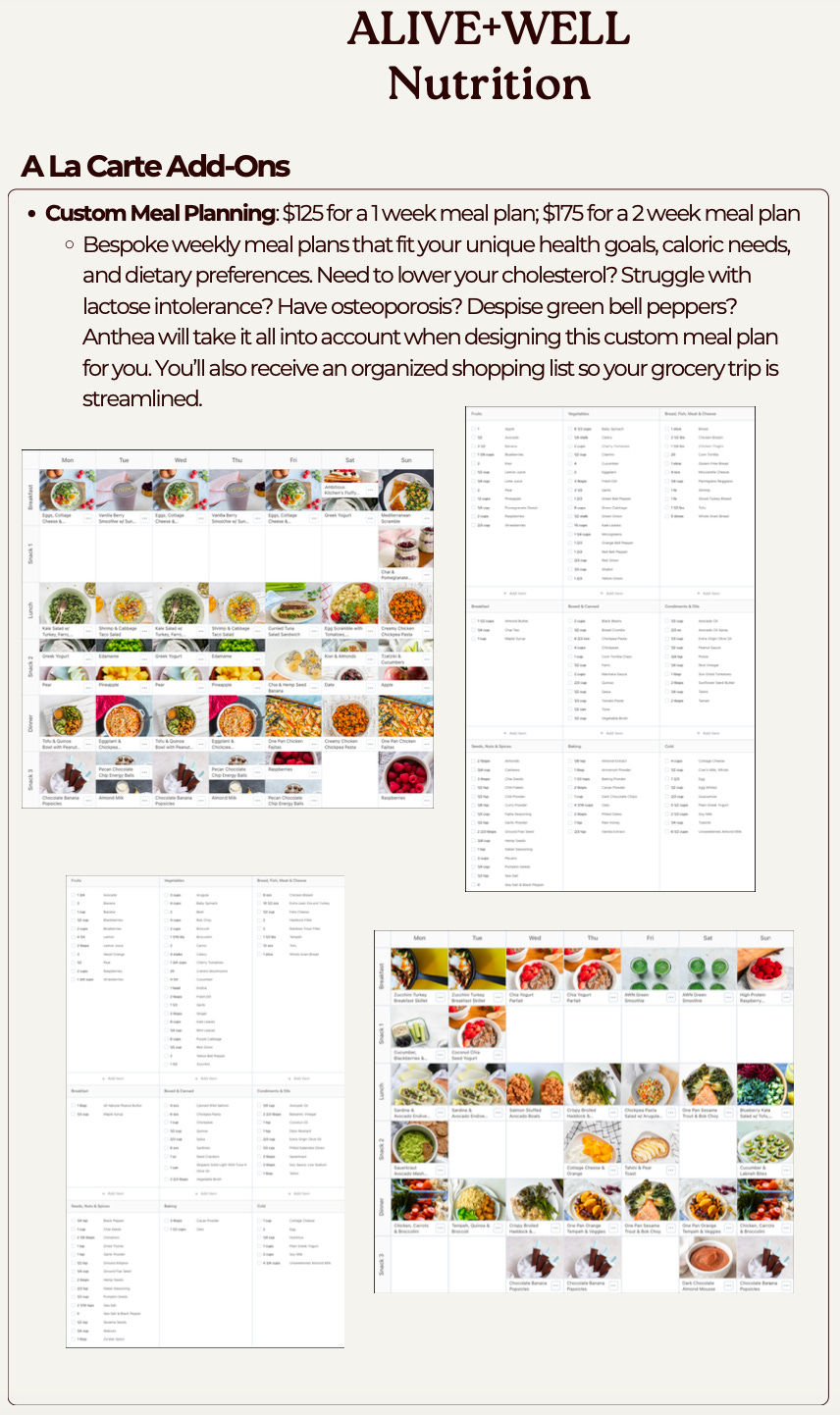How I Feel About Meal Plans
Also: Whether you need to take a probiotic supplement, foods for better sleep, and PCOS basics.
Can you believe it’s almost April? I can’t.
Each winter feels both increasingly dark and swift to me. Every year I forget how low the cold, short days make me feel — and how soon they’re suddenly behind me. Maybe it’s a metaphor for life: no feelings, wonderful or awful, stick around forever. Or maybe it’s just climate change at work.
Let’s spring forward.
Nutrition-Adjacent News, Thoughts + Facts
If you’ve been diagnosed with polycystic ovarian syndrome (aka PCOS), read this New York Times article that explains why weight loss at any cost is not the answer to treating PCOS. When I work with people with PCOS I focus on a multi-pronged approach that often includes: a low-moderate carbohydrate and high-protein eating pattern for improving insulin sensitivity, hormone supportive foods like daily ground flaxseeds and cruciferous veggies, tailored supplement protocols with nutrients like inositol, NAC, and vitamin D, and regular resistance training. Since many people with PCOS often struggle with gut imbalances and high cortisol levels, there’s also considerable attention paid to nourishing the gut microbiome and reducing stress, as well. Calories are never the only consideration.
Sad but true: My friend sent me this funny-but-devastating Instagram reel a couple of months ago that perfectly captures how preposterous nutrition advice has become. No wonder people are so deeply confused.
Should I take a probiotic supplement for general wellness purposes? I answered this question for Well+Good. Click here to read all about it. Plus, a few other topics I recently wrote about:
Eats of the Month
Just because I encourage people to cook at home more doesn’t mean I don’t have days when I loathe doing it myself. I’ll often suggest balanced recipes to my clients, then end the workday thinking, What the heck should I make for dinner? Sigh.
To help myself liven up my weekly rotation, I set a new year’s resolution to make at least 1 *new* recipe each week.
I’m sharing photos of the final products in case you too could use some inspiration. If you’re interested in making any of them, shoot me a note (either by replying to this newsletter or writing to me at anthea@alivewellnutrition.com) and I’ll happily share the creator’s original recipe with you.
Here’s what I managed to make this month:
Surprising Ways Your Body Protects You When You Aren’t Treating It Right
Most of us find fault with our bodies before praising them.
Our brains are hardwired to focus on the negative as a means of survival. If our ancestors floated along appreciating the sunshine back in the day, they would’ve missed the predators lunging towards them. By focusing first and foremost on threats, our brains quite literally kept us alive.
These days, most of us aren’t sprinting from imminent danger (if we’re lucky). Real threats — like animal stalkers — have been replaced by perceived threats, like, say, the return of skinny jeans as a trend.
Though you may loathe certain parts of your body, it carries out essential functions 24/7. Breathing and blinking are givens, but what about some of the lesser-known ways our bodies protect us, even when we aren’t treating them with the respect they deserve?
Here are just a couple of nutrition-linked examples:
If you severely restrict calories, your brain up-regulates thoughts about food as a means of protection. This can present as intrusive thoughts about food during the day, as well as dreams of food overnight. These messages are your brain’s way of telling you that you’re undernourished. By nudging you to think about food not only during waking hours but even while you’re sleeping, your body is encouraging you to seek out what it needs: fuel in the form of more calories.
It’s not uncommon to lose one’s period when under-eating and/or over-exercising. Women’s health MD and herbalist Aviva Romm often calls the menstrual cycle a monthly ‘report card.’ If your period is MIA without any clear reason — such as menopause or the use of an IUD — your body just may be protecting you. The body needs to feel safe enough in order to grow another human. If it’s under-nourished, over-exercised, and stressed the f*ck out, it will withhold your ability to create new life by pausing mechanisms like ovulation. (Of course there are many other reasons why one might experience menstrual irregularities and fertility struggles, this is just one of them.)
So often we feel like our bodies are working against us but I invite you to ask yourself: Am I giving my body what it needs to thrive or am I over-working and under-fueling it in the name of ‘health’?
Here’s How I Feel About Meal Plans
It’s complicated. I firmly believe that a meal plan is *not* going to change your life or repair your relationship with food. That’s because…
…they’re not sustainable. Nobody is going to follow a meal plan forever
…they don’t allow for spontaneity. If you’re tightly tethered to a meal plan, you may start to feel anxious or guilty when eating meals that aren’t included on the plan
…they’re usually not personalized. (What good does a pre-set meal plan from an influencer do you if it’s full of foods you don’t even eat or enjoy?)
…they’re not recommended for anyone struggling with an eating disorder or disordered eating
…they don’t teach you how to make true behavior change. A meal plan won’t help you unlearn a decades-old emotional eating habit
All that said, I believe meal plans can be useful in some cases.
When working 1:1 with clients, I aim to teach people how to build balanced meals and make intentional food choices for their individual health conditions, preferences, and goals. Knowing how to do this is what makes intentional eating choices feel doable no matter where you are.
Once you’ve mastered this, though, meal plans can be a helpful tool if you…
…are committed to and excited about cooking more meals at home
…are bored of your current meal rotation and want fresh ideas
…want templates for balanced days that will meet your unique nutritional needs, whether you’re working on building muscle, lowering your cholesterol, or trying to avoid a dietary trigger like lactose
…would like to get back to a few weeks of well balanced meals without having to do all of the recipe research yourself
That’s why I’m starting to offer bespoke meal plans. If you’re a brand new client, I’ll require a 30-minute 1:1 session before I create your meal plan so that I can get a sense of your health history, goals, and current nutritional needs and preferences before crafting a tailored plan for you. Reach out to info@alivewellnutrition.com if you’re interested in this service.
Hungry for more? Schedule your free intro call here if you’re interested in working with Anthea and subscribe to the ALIVE+WELL Nutrition newsletter for nutrition news you can actually trust.









